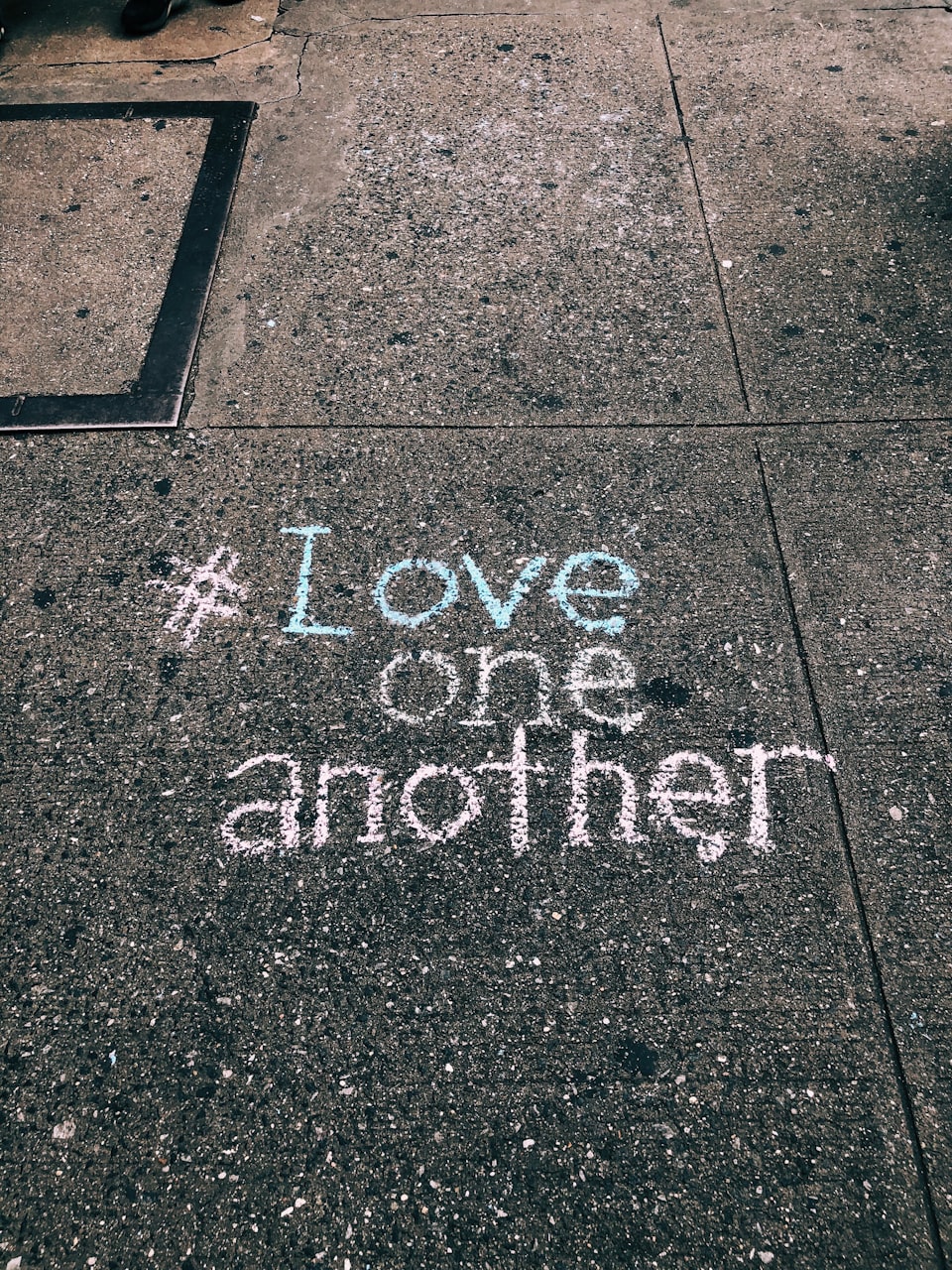small love = big love

“A new command I give you: Love one another. As I have loved you, so you must love one another. By this everyone will know that you are my disciples, if you love one another.” John 13:34-35
I have role models. Most of them came by chance. My parents came first, followed closely by my teachers, classmates, and cartoon characters. After them, I added characters in books, Sunday school teachers, coaches, and a handful of celebrities. From my perspective, my selection of role models seems haphazard and random, but I'm struck that, through my haphazard selection of role models, I simultaneously chose very good ones and neglected to recognize a particular group of people.
This group is recognized by their lack of recognition. It's a diverse group, and these people constantly surround me, yet they remain almost unnoticed except when I interact with them directly. These people love me, but not in a way that's overt or obvious. They don't love me with the same kind of love my family gives me. Nor do they love me with a romantic kind of love that may come from an admirer. It's the kind of love that's patient, kind, selfless, and free. It's the kind of love that I usually don't notice, even when I'm fully immersed in it. It comes from people who may not know my name, but have decided to put my interests above their own. If they obtain some physical gain from this, I haven't seen what it is.
My brain decided to call this, "small love" the first time I noticed it. That's what I called it when I still thought that loving others meant making enormous, life-altering sacrifices to let someone else get ahead of me in the rat race. It took me a while, but I eventually discerned that true "enormous sacrifices" usually take the form of small things: encouraging someone when I'd rather insult them, or helping someone with their daily chore when I know they're in a hurry, or showing gratitude to someone who's just "doing their job." We call these things small because we, as humans, don't see things the way God sees them. That is, these are the big things in God's eyes.
If I can't be trusted in these (apparently) small things, why should I expect to perform great acts of heroism? Put another way, does one (apparently) huge moment of sacrificial love cover a lifetime of (apparently) small decisions: being impatient in long lines, being rude to bureaucrats on the phone, and ignoring those in need? I don't think so.
Here's the thought experiment: what did Jesus do for the first 33 years of his life? That's the first 99.98% of his life on Earth. I'm certain that he "took up his cross daily" (just as we should). But why didn't Jesus just appear one day, get murdered, then come back to life in glorious fashion? If death and resurrection were the only goal of his existence on Earth, why did God himself choose to go through the disgusting process of birth, all the angst of being a toddler through teenager, then spending the majority of his adult life working as a small-town carpenter?
John Howard Yoder says it's because Jesus' sacrifice didn't being when the first nail was hammered into the cross. Jesus bore his cross every day of his life. Yoder's book (which you can find on Ethical Book Search for $4.43, including shipping!) tells us that "taking up your cross" begins when you live in such a way as to make the world hate you.
Don't miss this — it's very subtle: Jesus grew up in little po-dunk town and worked as a manual laborer for about 20 years. How would you feel if one of the guys nailing shingles on the roof of the house next door came down and, in his heavily accented English, told you to repent from your sin? More than that, he starts going around to all the local churches, calling all the pastors and deacons hypocrites. Just to add insult to injury, he starts his own church, says it's the only way to Heaven, then fills it with known embezzlers, prostitutes, and a handful of kids who aren't even old enough to vote.
When God became man, he didn't stop acting like God. He continued doing the important work that he's always done: loving and caring for those whom we neglect. If he had chosen to act like a normal human, the High Priests and Pharisees would never have noticed him, and he would never have been put on a cross.
We easily recognize that Jesus lived perfectly, yet we continue to insist on our own priority systems instead of his. The Pharisees did the same thing. They worshiped their religion as God and murdered God in the process. They used every shred of available human wisdom, thousands of years of theological tradition, and the sure heritage of being God's chosen people, but they still made the error of putting their own understanding of the world above God's reality.
They refused to see the oppressed, the outsiders, and the unclean as the greatest in God's kingdom. They failed to realize that the poorest among them are the richest in the commonwealth of Heaven. They even witnessed the presence of God himself, but couldn't recognize him because they put their faith in their man-made religion instead of the truth himself. Jesus firmly rejected all of this even while actively working, in (apparently) small ways to reverse the damage they caused.
If we choose to follow him in this, we will experience persecution. We will be hated by the world. We'll become like Jesus: penniless, itinerant, unpopular, hated, and homeless. He had no place to lay his head because no person could stand the (apparent) shame of hosting God himself in their home. If Jesus had chosen human wisdom, he would have worked diligently at his job, preached some sermons on the weekends, invested well, and died at a ripe old age with a large congregation. Yet Jesus, who created wisdom and knows wisdom and is wisdom chose the opposite of human wisdom. He recognized that loving others means halting the pursuit of so-called "big things" so that he could do more important (apparently) small things like delivering the good news of repentance for the whole world.
Jesus used his entire life to teach, heal, and love. In typical human fashion, we've done our best to totally ignore any of his teachings that might cause us to follow his footsteps down that painful path. Yoder even claims that we've misunderstood the command to "take up our cross," or to "bear our cross." The crosses we have to bear aren't things that happen to us. They aren't sicknesses we were unlucky enough to contract; they aren't thorns in our side that we wish would go away. The crosses we're supposed to take up and bear are the result of the things that happen through us.
When you live as radically as Jesus, people will call you stupid and feel sorry for you. When you give radically, they'll tell you to ignore the Scripture when it says not to worry about what you'll eat or drink; they'll tell you some platitude like, "God helps those who help themselves." When you love radically, they'll treat you just like they treated Jesus and tell you not to spend so much time with "unsavory" characters, lest you learn their ways; you'll find yourself surrounded and loved by people that don't give and can't give any benefit to you. When you, like Jesus did when he was born a human, condescend radically, people will shame you for not "living up to your potential." They'll tell you things like, "You could have done so much better," or "You're wasting the gifts that God's given you." But you, like Jesus, know that you're not actually condescending. In fact, by (apparently) "wasting your gifts" in a human sense, you're actually becoming greater and greater in a godly sense.
Look at it this way: God, in his infinite wisdom, had the choice to enter the world in any way he wanted. He could have appeared, like Zeus, in the form of a mighty warrior or a fearsome animal. He could have flown down from the heavens like Superman and used his godlike powers to punch and zap the Roman emperor into submission. But instead of all that, he "wasted" his infinite power by becoming a baby (likely with no control over his bowels for several years), growing up as a small town carpenter, and existing as an oppressed minority.
When I think of Jesus' sacrifice, I think of him as a full-grown adult on a cross, yet I forget that Jesus himself tells us that the child is the greatest in the kingdom of heaven. Put another way, which was the greater condescension: God becoming a human baby, or a human becoming crucified? Lots of people were crucified under Rome, but only one of them was God.
We might be tempted to believe, as many people of Jesus' time did, that he "could have done so much better." He could have marched an army across the entire world. He could have crowned himself king over all society. He could have spoken a word and made every mountain kneel before him. Heck, he could have at least made himself better looking! But none of those things would have made him great. The only entry into the world worthy of the almighty creator of the universe was through a teenager's birth canal.
So, here's the takeaway. If you want to know what greatness and perfection look like, consider how our great and perfect God chose to live as a human. Do you really think you can do better?


